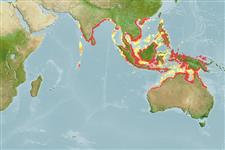Common names from other countries
>
Eupercaria/misc (Various families in series Eupercaria) >
Sciaenidae (Drums or croakers)
Etymology: Nibea: Greek, niba, nipsis = to wash.
More on author: Lacepède.
Environment: milieu / climate zone / depth range / distribution range
экология
морской; пресноводный; солоноватоводный демерсальный; амфидромный; пределы глубины 1 - 40 m. Tropical; 22°N - 23°S, 72°E - 149°E (Ref. 57000)
Indo-West Pacific: coasts of India and Sri Lanka eastwards extending to Queensland, Australia and New Guinea and north to Viet Nam (Ref. 3490). Found in the lower Mekong basin (Ref. 36667).
Size / Вес / Возраст
Maturity: Lm ? range ? - ? cm
Max length : 60.0 cm SL самец/пол неопределен; (Ref. 9772); common length : 40.0 cm SL самец/пол неопределен; (Ref. 9772)
колючие лучи спинного плавника (общее число) : 10 - 11; членистые (мягкие) лучи спинного плавника (общее число) : 27 - 33; колючие лучи анального плавника: 2; членистые (мягкие) лучи анального плавника: 7. Snout rounded, but not swollen or projecting; upper jaw length 38-44 % of head length, lower jaw length 44-53 % of head length. First pair of mental pores close together, united by a crescent-shaped groove just behind symphysis. Teeth differentiated into large and small in both jaws. Second anal spine long, stiff, 39-59 % of head length. From 8 to 13 scale rows above lateral line to origin of dorsal fin, 12-17 scale rows below lateral line to origin of anal fin (total 21-29 scale rows). Swim bladder carrot-shaped, with 18-22 pairs of arborescent appendages along its sides, the first pair entering head beyond transverse septum. Sagitta (large earstone) with a tadpole-shaped impression, the tail of which is J-shaped.
Inhabits shallow coastal waters and estuaries (Ref. 9772). Juveniles occur in brackish estuaries and often ascend the lower reaches of large, turbid rivers (Ref. 2847). Found in the basin-wide mainstream of the lower Mekong (Ref. 36667). Encountered in medium to large-sized rivers both in the lower and middle Mekong (Ref. 12975). Feeds on small fishes and invertebrates. Marketed fresh as well as dried salted.
Life cycle and mating behavior
Maturities | размножение | Spawnings | Egg(s) | Fecundities | личинки
Lal Mohan, R.S., 1984. Sciaenidae. In W. Fischer and G. Bianchi (eds.) FAO species identification sheets for fishery purposes. Western Indian Ocean (Fishing Area 51). Vol. 4. FAO, Rome. pag. var. (Ref. 3490)
Статус Красного Списка МСОП (Ref. 130435)
CITES (Ref. 128078)
Not Evaluated
Угроза для людей
Harmless
Использование человеком
рыболовство: коммерческий
дополнительная информация
инструменты
Специальные отчеты
Скачать в формате XML
ресурсы в Интернет
Estimates based on models
Preferred temperature (Ref.
115969): 26.7 - 29.1, mean 28.4 (based on 942 cells).
Phylogenetic diversity index (Ref.
82804): PD
50 = 0.5010 [Uniqueness, from 0.5 = low to 2.0 = high].
Bayesian length-weight: a=0.00794 (0.00464 - 0.01359), b=3.08 (2.93 - 3.23), in cm Total Length, based on LWR estimates for this species & (Sub)family-body (Ref.
93245).
Trophic level (Ref.
69278): 3.9 ±0.59 se; based on food items.
устойчивость к внешним воздействиям (Ref.
120179): средний (среднего размера), минимальное время удвоения популяции 1.4-4.4 года (Preliminary K or Fecundity.).
Fishing Vulnerability (Ref.
59153): Moderate to high vulnerability (49 of 100).
